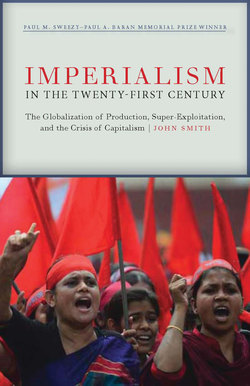Imperialism in the Twenty-First Century

Реклама. ООО «ЛитРес», ИНН: 7719571260.
Оглавление
John Smith. Imperialism in the Twenty-First Century
Отрывок из книги
THE PAUL A. BARAN – PAUL M. SWEEZY MEMORIAL AWARD
John Smith’s book, Imperialism in the Twenty-First Century, is the inaugural winner of the Paul A. Baran–Paul M. Sweezy Memorial Award. This award, established in 2014, honors the contributions of the founders of the Monthly Review tradition: Paul M. Sweezy, Paul A. Baran, and Harry Magdoff. It supports the publication in English of distinguished monographs focused on the political economy of imperialism. The aim is to make available in English important work written in the tradition of Paul M. Sweezy, Paul A. Baran, and Harry Magdoff, broadly conceived. It will also apply to writings previously unpublished in English, and will include translations of new work first published in languages other than English.
.....
Buyer-driven GVCs [Global Value Chains] are typically focused on reduced sourcing costs, and … this means significant downward pressure on labor costs and environmental management costs. Some suppliers are achieving reduced labor costs through violations of national and international labor standards and human rights laws. Practices such as forced labor, child labor, failure to pay minimum wage and illegal overtime work are typical challenges in a number of industries. In addition to downward pressure on wages, the drive for reduced costs often results in significant occupational safety and health violations…. Downward pricing pressure has created economic incentives for violating environmental regulations and industry best practices, leading to the increased release of disease-causing pollutants and climate change–related emissions. Cutting costs by engaging in negative social and environmental practices is a particularly acute trend in developing countries.48
Bhagwati even uses a feminist argument to defend his beloved multinational corporations, and was one of the few to spring to the industries’ defense after the Rana Plaza disaster. Casting around for evidence of the “liberating effect [on] young girls in Bangladesh” of employment in garment factories, he quotes a study on girls’ adolescence in developing countries:
.....